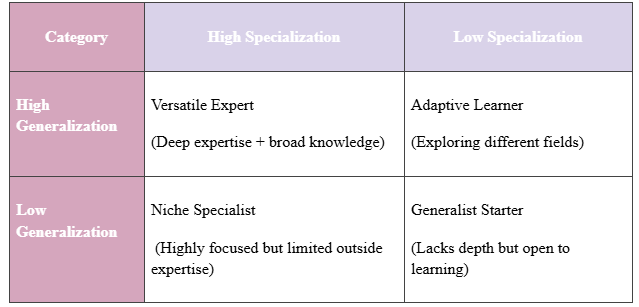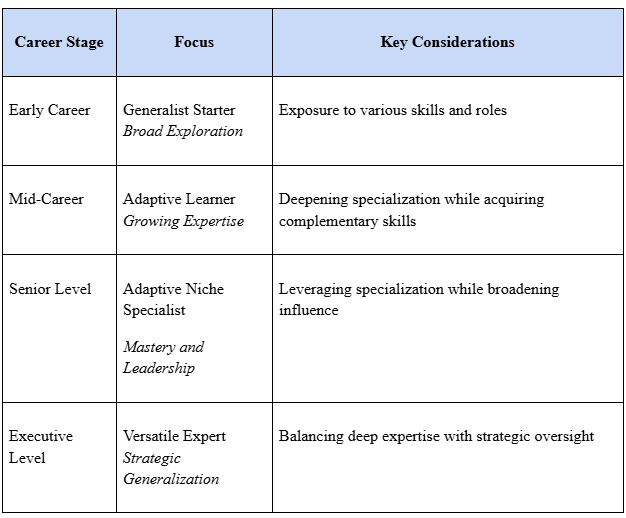One of the biggest challenges in professional development is balancing specialization with the need for continuous growth. While assigning tasks based on expertise enhances efficiency, it can also create unintended limitations for long-term development.

The Case for Lifelong Learning and Generalist Skills
“Jack of all trades, master of none, but oftentimes better than master of one”
-William Shakespeare
It is my opinion that most skills like energy are easily transferable across different spectrums. Learning to paint can open up a new approach to problem solving. It is important to acquire a mix of deep expertise and broad knowledge. No matter the level of specialization required in a field, generalist skills — such as communication, adaptability, and strategic thinking — enhance long-term career success. Professionals who cultivate these skills are better positioned to:
- Navigate industry shifts and technological advancements.
- Lead diverse teams by understanding multiple perspectives.
- Solve complex problems that require interdisciplinary thinking.
Even highly specialized roles benefit from generalist competencies. A medical specialist, for example, may excel in their technical field, but their ability to communicate effectively with patients and colleagues significantly impacts their success. Haven’t we all met a grumpy doctor or nurse that made us wonder what they were doing in the medical profession with their clear lack of empathy?
The Specialization vs. Generalization Matrix
Rather than viewing specialization and generalization as opposing forces, professionals should aim to transition their learning focus throughout their careers. However, the transition does not have to be always linear and may depend on personal goals, industry demands, and organizational needs.
A structured way to understand this balance is through the Specialization vs. Generalization Matrix:

The Career Journey: Mapping Specialization and Generalization.
Understanding where individuals should be at different points in their careers is crucial for long-term success. A structured career journey typically follows this trajectory:

Shifting Quadrants: What to know
Understanding when to move between specialization and generalization is key for career success. Professionals should consider shifting when:
- Their current role feels stagnant or limiting.
- Industry trends require a broader skill set.
- Leadership responsibilities demand a mix of expertise and adaptability.
- They seek career advancement that necessitates strategic thinking beyond technical mastery.
This career journey framework highlights the importance of adaptability. While specialization may be key in certain phases, generalization is equally crucial for long-term versatility.
Beyond Skill Acquisition: Creating an Environment for Growth
The real question is not whether people should specialize or generalize, but rather: Are we creating an environment where people feel inspired to grow? Learning new skills can be challenging, and when imposed without purpose, it often feels like an obligation rather than an opportunity. The mindset must shift from “you need to upskill because the job demands it” to “we grow together because it strengthens our collective impact.”
Instead of rigid competency frameworks, organizations should provide psychological safety — a space where individuals feel comfortable trying, failing, and improving without fear of punishment. Growth should feel like an exciting journey, not an uphill struggle.
